Delhi riots: Muslim women recall horror of Molotov cocktails and arson
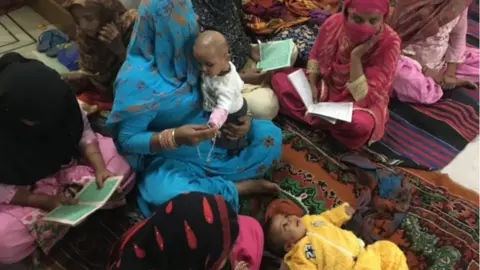 Bushra Sheikh
Bushra SheikhThe deadly religious riots that have swept parts of the Indian capital are proving that women and children are often the most vulnerable victims in any conflict, writes the BBC's Geeta Pandey in Delhi.
The violence in north-east Delhi has left more than 40 people dead and the victims include both Hindus and Muslims. For the thousands of Muslim women and children left homeless, the future appears bleak.

In a crowded large hall in the Indira Vihar area, scores of women and children displaced by the riots are sitting on carpets and mats. Many of the young women are carrying babies, but there are also toddlers, and slightly older children playing in groups.
The hall belongs to a Muslim businessman. It has been turned into a refuge for the displaced.
The women and children here fled rioting Hindu mobs who attacked their homes in Shiv Vihar, one of the worst-affected areas.
A working class Hindu-dominated neighbourhood with a sizeable Muslim population, Shiv Vihar is a maze of narrow bylanes situated next to a filthy drain. A couple of hundred metres, along the same drain, are the Muslim-majority areas of Chaman Park and Indira Vihar.
Separating the Hindu and Muslim majority areas is just a road and the two communities have co-existed peacefully for decades. But all that has now changed.
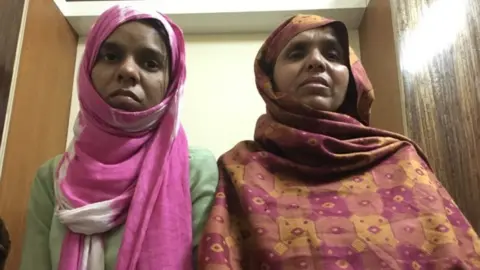 Bushra Sheikh
Bushra SheikhNasreen Ansari, who is among those who fled their homes in Shiv Vihar, says their ordeal began on Tuesday afternoon, when only women were at home. Their menfolk were miles away in another part of Delhi, attending an Ijtema, a Muslim religious gathering.
"We saw about 50-60 men. I don't know who they were, we had never seen them before," says Nasreen. "They told us they had come to protect us and told us to stay indoors."
As she and other women watched from their windows and terraces, they soon realised that the men were not there to protect them.
She shows me a video she shot from the window. It shows some of the men, they are all wearing helmets and carrying long wooden sticks.
Nasreen says the men were shouting Hindu religious slogans like Jai Shri Ram (Hail Lord Ram) and reciting lines from Hanuman Chalisa (a hymn praising the powers of Hanuman, the monkey god).
Her mother, Noor Jehan Ansari, says a Muslim neighbour called her to say that her house had been set on fire.
"From our window, we could see another Muslim neighbour's home and his medicine shop burning."
The attackers, she says, vandalised the electricity transformer and as dusk approached, the area plunged into darkness.
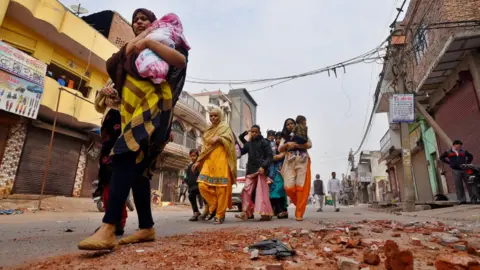 Getty Images
Getty Images"Soon, there were fires burning all around us, they were hurling Molotov cocktails and cooking-gas cylinders, targeting shops and homes belonging to Muslims. Hindu homes were unharmed," she says. "We never thought something like this will happen to us. Our only fault is that we are born Muslim."
Nasreen says the women made dozens of calls to the police. "Every time they would assure us that they'd be here in five minutes."
At one point, Nasreen says she called some relatives and told them that they were "not going to survive the night".
They were finally rescued at 03:00, 12 hours after the siege of their homes began, when police, accompanied by Muslim men from Chaman Park and Indira Vihar finally arrived.
"We ran for our lives, with just our clothes on our backs. We didn't even have the time to put on our shoes," she says.
Several other women at the shelter recounted similar stories of what they were subjected to that night.
Shira Malik, 19, said she and her family took shelter in a neighbour's house. "We were trapped. Stones and Molotov cocktails were raining in from the outside."
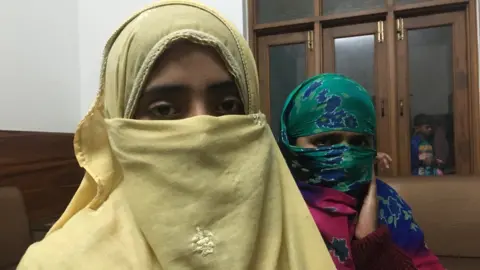
Many of the women told me how close they had come that night to being sexually assaulted. The attackers, they said, pulled their scarves and tore their clothes.
A mother of a one-year-old wept as she narrated how her clothes were torn to shreds by several men who entered her house.
Another woman, in her early 30s, said the only reason she was alive was because of help from her Hindu neighbours.
"My neighbours told the mob, 'She is one of us. There is no Muslim woman here.' When the mob went towards the back lane, they helped me escape," she said.
The senseless violence of the past few days began on Sunday evening as a small clash a few kilometres from Shiv Vihar between supporters and opponents of a new controversial citizenship law.
Within hours, it had affected many other neighbourhoods, including Shiv Vihar and Chaman Park.
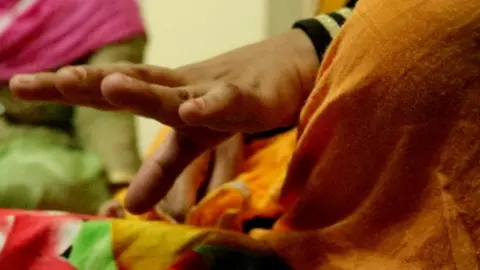 Bushra Sheikh
Bushra SheikhAs I walk around the area, the roads still bear witness to the chaos that was visited here. Dozens of riot policemen keep a watch, ensuring no fresh violence occurs.
Bricks and stones are strewn everywhere, there are burnt vehicles, shops and homes. In Shiv Vihar, facing the drain is a mosque that was also set on fire by the vandals.
Back at the shelter in Indira Vihar, the women say they have no idea when - if at all - they will be able to return home.
Shabana Rehman says her three children keep asking her when they can go home.
"My home was burnt down by the arsonists. Where will we go now? What's the future of my children? Who will look after us? We have lost all our documents," she says, tears flowing down her cheeks.
Her home of decades in Shiv Vihar is just a short walk away, but the gap seems unbridgeable.

